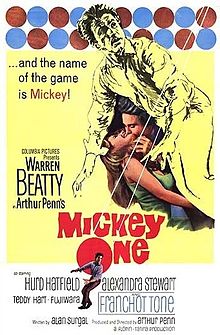- Mickey One
-
Mickey One 
original film posterDirected by Arthur Penn Produced by Arthur Penn Written by Alan Surgal Starring Warren Beatty
Alexandra Stewart
Hurd HatfieldMusic by Eddie Sauter
Stan Getz (improvs)Cinematography Ghislain Cloquet Editing by Aram Avakian Distributed by Columbia Pictures Release date(s) September 27, 1965 Running time 93 minutes Country United States Language English Mickey One is a 1965 surrealistic dramatic film starring Warren Beatty and directed by Arthur Penn from a script by Alan Surgal. Its kaleidoscopic camerawork, film noir atmosphere, lighting and design aspects, Kafkaesque paranoia, philosophical themes and Warren Beatty's performance in the title role turned the film into a cult classic. Penn and Surgal ignored the usual conventions of narrative for a freewheeling approach to their dramatic devices and Chicago locations.
The film's soundtrack, reverberating with hints of everything from Béla Bartók to bossa nova, re-teamed Stan Getz with arranger Eddie Sauter, following their classic album Focus.[1]
Contents
Plot
After incurring the wrath of the Mafia, a stand-up comic (Warren Beatty) flees Detroit for Chicago, taking the name Mickey One. Eventually he returns to the stage, but is wary of becoming successful, afraid that he will attract too much attention. When he gets a booking at the upscale club Xanadu, he finds that his first rehearsal has become a special "audition" for an unseen man with a gruff voice. Paranoid that the mob has found him, Mickey runs away. He decides to find out who "owns" him and square himself with the mob, but he doesn't know what he did to anger them or what his debt is. Searching for a mobster who will talk to him, he gets beaten up by a bunch of nightclub doormen. Mickey finally concludes that it's impossible to get away and be safe, so he pulls himself together and does his act anyway.
In traveling about the city, Mickey continually sees a mute mime-like character known only as The Artist (Kamatari Fujiwara). The Artist eventually unleashes his Rube Goldberg-like creation, a deliberately self-destructive machine called "Yes," an hommage to the sculptor Jean Tinguely.[2]
Cast
- Warren Beatty as Mickey One
- Alexandra Stewart as Jenny
- Hurd Hatfield as Castle
- Franchot Tone as Rudy Lopp
- Teddy Hart as Berson
- Jeff Corey as Fryer
- Kamatari Fujiwara as The Artist
- Donna Michelle as The Girl
- Ralph Foody as Police Captain
- Norman Gottschalk as The Evangelist
- Richard Lucas as Employment Agent
- Jack Goodman as Cafe Manager
- Jeri Jensen as Helen
- Charlene Lee as The Singer
Release and rediscovery
As the first major Hollywood studio film to display an extensive influence from the New Wave in the cinematography and editing, Mickey One received a good send-off at the 1965 New York Film Festival, and Penn received a nomination for a Golden Lion at the Venice Film Festival. However, critical reaction was mixed, and distribution was spotty, with the film arriving in some areas at drive-ins rather than first-run theaters, and it quickly vanished. Nevertheless, Beatty and Penn soon teamed again for Bonnie and Clyde in 1967.
The rediscovery of the film began in 1995 with a booking at San Francisco's Castro Theater and a reevaluation by Peter Stack:
Mickey One is, in essence, a jazz film with an edgy style in which shadings and tone of voice are everything. It is laced with American idioms in its script by Alan Surgal, and most of Beatty's lines have a smart-alecky tone. When he goes on the run, Mickey meets a woman who wonders who he is (since he can't shake his show-biz patina) and he hits her with the line: "I'm the king of silent movies hiding out till the talkies blow over." In another place he verbally assaults a nightclub owner who can't figure out why Mickey's so edgy, saying, "I'm guilty of not being innocent." At the start we see pretty-boy Beatty as a hot comic in Detroit. He's got it all -- good looks, the swagger of a deft improviser -- and he's having a torrid affair with a blond siren. (The film is filled with women bursting with desire). But fortune quickly turns -- witness to a torture murder in a back room, the comic flees, hoboes his way to Chicago's West Side and takes refuge in a junkyard. There he runs into another nightmarish scene -- police investigating a murder in an automobile crusher. The cinematic invention in Mickey One has been dismissed by some critics as contrivance. But Penn may have been decades ahead of his time in depicting an urban America as gallery of paranoia, cynicism and loneliness. In a classic scene, the comic is up against a brick wall auditioning at a nightclub, a single, powerful spotlight trained on him so he can't see into the audience. Penn creates an agonizing moment of a man talking awkwardly to God while looking as if he's standing before a firing squad.[3]
Notes
External links
- Mickey One at the Internet Movie Database
- Mickey One at the TCM Movie Database
- Mickey One at AllRovi
- Village Voice: "Mickey One at MOMA" by J. Hoberman (April 15, 2008)
Films directed by Arthur Penn 1950s The Left Handed Gun (1958)1960s The Miracle Worker (1962) · Mickey One (1965) · The Chase (1966) · Bonnie and Clyde (1967) · Alice's Restaurant (1969)1970s 1980s Categories:- 1965 films
- American films
- English-language films
- Black-and-white films
- 1960s crime films
- Films shot in Chicago, Illinois
- Independent films
- Films directed by Arthur Penn
Wikimedia Foundation. 2010.
